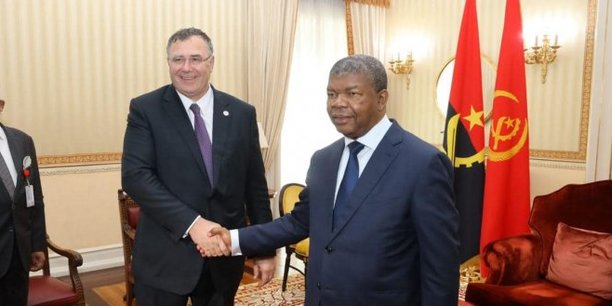In 2024, the French group will invest over $600 million in Congo while kicking off a major project in Angola.
TotalEnergies, also gearing up to collaborate with Africa’s wealthiest individual, Aliko Dangote, in Nigeria, continues to strengthen its presence across the continent, where the group operates in 36 countries.
The past few days have been quite eventful for TotalEnergies’ CEO, Patrick Pouyanné.
Not only due to the preparations and pressure surrounding the group’s general assembly held on May 24th in Paris but also following his mini African tour earlier this week.
Starting in Oyo, Congo Brazzaville last Sunday, he met with President Denis Sassou Nguesso, accompanied by Minister of Hydrocarbons Bruno Jean Richard Itoua, to announce that the French oil company plans to invest over $600 million throughout the current year.
This investment aims to strengthen both oil exploration and production in the country and maintain production in the deep offshore Moho Nord field, which represents nearly 50% of the 140,000 barrels of oil produced daily nationwide.
Patrick Pouyanné stated, “We hope to return in four months’ time and announce a significant discovery in Congo,” emphasizing that the company has already received two drilling rigs, one of which will be used to drill a well under the Marine XX license.
This investment comes after TotalEnergies recently increased its stake to 63.5%, up from 53.5%, in the Moho field following an agreement with British oil and gas company Trident Energy, which retains 21.5% ownership. The remaining 15% is held by the National Oil Company of Congo (SNPC).
Heading Towards Low Carbon Oil in the Kwanza Basin
Following his visit to Oyo, Patrick Pouyanné traveled to Luanda, Angola. After his meeting with President Joao Lourenco, he officially launched the deepwater Kaminho project. It marks the first major development of its kind in the Kwanza Basin, jointly owned (40%) by TotalEnergies and Malaysian Petronas, with Sonangol, holding a 20% stake, also participating.
This project, targeting a production of 70,000 barrels per day, aligns with the French major’s oil and gas industry decarbonization strategy. Local experts from TotalEnergies will collaborate with those from the national oil company.
An agreement has been signed to this effect. For the parties involved, the aim is to “combine [their] efforts” to “promote innovation and low-carbon technologies in the energy sector in Angola, particularly to combat methane emissions, and contribute to the diversification of the Angolan energy mix.”
This investment, the financial terms of which have not been disclosed, comes at a time when both national and international investors in Angola are calling for a reduction in the oil production tax rate, currently fixed at 20%.

In West Africa, in Nigeria, TotalEnergies has also reportedly secured a deal with Aliko Dangote for the supply of oil to his mega-refinery, according to Reuters.
Patrick Pouyanné had discussions to this effect with the continent’s wealthiest individual last week in Kigali, during the Africa CEO Forum.
The French group, which celebrated its 100th anniversary in March, has almost intertwined its history with Africa.
TotalEnergies, which has been exploiting hydrocarbons in Congo since 1969, credits itself with the discovery of over 60% of the country’s initially recorded reserves.
In Angola, TotalEnergies’ 70-year history has witnessed significant changes and crises in the country, but the success of the resources of Africa’s second-largest oil producer has occasionally posed a challenge to Nigeria’s top position.
The French multinational is spearheading several large-scale oil and gas projects across the continent, notably the controversial LNG project in Mozambique, which was suspended in 2021 following an escalation of violence and jihadist threats, but the French group aims to revive it.
With such a history, Africa will inevitably be a focal point at Friday’s general assembly, against the backdrop of fierce criticism from pro-environmental NGOs, as TotalEnergies staunchly defends its multi-energy policy with a focus on green energy.